- Home
- Nick Carter
Beirut Incident Page 3
Beirut Incident Read online
Page 3
I frowned in concentration, then recited in a monotone: "Government Security Information Bulletin Number Three-twenty-seven, June eleven, 1973. 'Latest information indicates the Syndicate Commission now comprises the following:
" 'Joseph Famligotti, sixty-five, Buffalo, New York.
" 'Frankie Carboni, sixty-seven, Detroit, Michigan.
" 'Mario Salerno, seventy-six, Miami, Florida.
" 'Gaetano Ruggjero, forty-three, New York, New York.
" 'Alfred Gigante, seventy-one, Phoenix, Arizona.
" 'Joseph Franzini, sixty-six, New York, New York.
" 'Anthony Musso, seventy-one, Little Rock, Arkansas. »
Easy. I waved a casual hand in the air-conditioned atmosphere. "Shall I give you a breakdown on each one of them?"
Hawk glared at me. "That's enough, Carter," he snapped. "I know you have a photographic mind… and you know I won't tolerate even subliminal sarcasm."
"Yes, sir." I would only take that sort of thing from David Hawk.
In slight embarrassment, I moved over to the hi-fi set and took off the three jazz records that had played through. "I'm sorry. Please continue," I said, sitting down again in the captain's chair facing Hawk.
He picked up where he'd left off a few minutes before, prodding the air in front of me with his cigar for emphasis. "The point is, the Commission can see as well as we can that success is gradually modifying the Syndicate's traditional structure. Like any other group of old men, the Commission is trying to block change, trying to bring things back to the way they used to be."
"So what are they going to do?" I asked.
He shrugged. "They've already started. They're bringing in what amounts to a whole new army. They've been recruiting all over Sicily, young, tough banditos out of the hills, just like they were when they — or their fathers — began."
He paused, chewing on the end of the cigar. "If they succeed well enough, the country could be in for a wave of gang violence that would match what we went through in the early 20s and 30s. And this time it would have racial overtones. The Commission wants to run the blacks and Puerto Ricans out of their territories, and they're not going to go without a fight, you know that."
"No way. But how are the old Dons getting their new recruits into the country?" I asked. "Have we any idea?"
Hawk's face was impassive. "We know exactly — or rather, we know the mechanism if not the details."
"Just a minute." I got up and took both our glasses over to the plasticized little counter that served as both bar and dinner table in SAMOCO's executive officer quarters. I made him another Scotch and water, splashed some brandy and soda into mine along with another ice cube, then sat back down again.
"Okay."
"It's really well done," he said. "They siphon their recruits through Castellemare in Sicily, then take them by boat to the island of Nicosia — and you know how Nicosia is."
I knew. Nicosia is the sewer of the Mediterranean. Every bit of slime that oozes out of Europe or the Middle East eventually coagulates in Nicosia. In Nicosia, the prostitute is the sophisticate, and what the others do on lower social scales is indescribable. In Nicosia, smuggling is an honored profession, thievery an economic mainstay, and murder a pastime.
"From there," Hawk went on, "they're smuggled on to Beirut. In Beirut, they are given new identities, new passports, then sent on to the States."
That didn't seem too difficult, but I was sure I didn't have all the details. Details were not one of Hawk's strongpoints. "That shouldn't be too hard to stop, should it? Just order extra security checks and identification data on everyone entering the country with a Lebanese passport."
"It isn't as easy as that, Nick."
I knew it wouldn't be.
"All their passports are American. They're forged, we know that, but they are so good we can't tell the false ones from the ones the government issues."
I whistled. "Anyone who could do that could make a small fortune in his own right."
"Whoever is doing it, probably is," Hawk agreed. "But the Mafia has lots of small fortunes to put out for such services."
"You could still put out a stop order on everyone coming from Beirut. It shouldn't really take too much interrogation to determine that the guy on the passport really comes from Sicily instead of the Lower East Side of Manhattan."
Hawk shook his head patiently. "It's not that easy. They bring them in from all over Europe and the Middle East, not just Beirut. They start in Beirut, that's all. Once they have their new identity papers and passports, they're often flown to another city, then put on a plane for the States. Mostly, they've been coming in on return charter flights, which lack so much basic organization to begin with that they're hard to control.
"Usually they have a group of them aboard the big cruise ships when they return to the States, too," he added.
I took a long swallow of my brandy and soda and pondered the situation. "You must have an agent on the inside by this time."
"We've always had agents inside the Mafia, or — that is — the FBI has, but they're pretty hard to maintain. Either their cover gets blown somehow, or they have to blow it themselves in order to testify."
"But you do have someone in there now," I pressed.
"The FBI does, of course, but we have no one in this pipeline that's bringing in the new recruits. That's one of our prime concerns."
I could see the direction in which things were going now. "Then that's what you want me for? To get into the pipeline?" Hell, that shouldn't be too hard. It was a project that would take some thought, but certainly one that could be done easily enough.
"Well," Hawk was equivocating, "yes. I mean, basically that's it. You see," he continued slowly, "the original plan called for us to get a man into the pipeline, then expose it, break it up, whatever. And it had to be one of our men. You know the FBI is out of the question when we're dealing in a foreign country."
I nodded.
"It could have been the CIA, of course, but it's too tied up with that Argentina thing right now, and anyway, the President…"
I finished the sentence for him. "And anyway, the President isn't too happy with the CIA these days, particularly with Grefe."
Bob Grefe was the current CIA chief and his differences with the President had been in every Washington «insiders» column for a month.
"Quite right," Hawk said, looking grim. "So they decided it was a job for AXE."
"Okay." But that left a lot unsaid. Why me, for instance? There were lots of good men in AXE. "What else?"
"Well," he said. "This whole idea of AXE planting a man in the pipeline had to be brought to the President's attention, of course, since there's a State Department angle involved." Hawk paused, searching for the right words, I guessed. "He thought it was a great idea, but then he said as long as we were going to do that, we might as well carry it a step further right on through to the top."
Somehow, I didn't like the sound of that. "What does 'right on through to the top' mean?"
"It means you wipe out the Commission," Hawk stated bluntly.
I sat for a moment in stunned silence. "Now hold on a minute, sir! The government has been trying to get rid of the Commission since 1931, when they first found out it existed. Now you want me to do it?"
"Not me." Hawk looked smug. "The President."
I shrugged with a show of indifference which I didn't feel. "Well, then I guess I'll have to give it a try."
I looked at my watch. "I've got to make out my report on Raschid and the Dutchman," I said. 'Then I guess I'd better catch a flight to Beirut, first thing in the morning."
One last night with Betty Emers, I thought. Betty with those exquisite breasts and her neat, businesslike approach to life.
Hawk stood up, also. He took an envelope out of his shirt pocket and handed it to me. "Here's your ticket to Beirut," he said. "It's the KLM flight out of Karachi. Arrives here at six-twenty-three this evening."
"This evening?"
&n
bsp; "This evening. I want you on it." Surprisingly, he reached over and shook my hand. Then he turned and let himself out the door, leaving me standing in the middle of the room.
I drained my drink, set the glass down on the counter, and went into the bathroom to pick up my clothes from the floor and start putting my stuff together.
As I picked up my bush jacket, the aluminum container of heroin I had taken from Haraid Raschid's broiled carcass fell to the floor.
I picked up the tube and looked at it, pondering what to do with it. I'd thought of turning it in, but now I had another idea. I realized I was the only one in the world who knew I had it.
All I needed were a couple of cigars that came in that type of container and it would be like playing the old three-shells-and-the-pea game at the carnival.
I smiled to myself and tucked the heroin away in my hip pocket.
Then I retrieved Wilhelmma from her spring holster on my dresser and began cleaning her meticulously, my mind racing.
Chapter 3
The flight to Beirut was uneventful. I spent the two hours trying to push thoughts of Betty Emers from my mind with attempts at mapping out a plan of action once I got to Lebanon.
In my business, of course, you can't really plan too far ahead. Nonetheless, a certain amount of direction is needed to get started. After that, it's more like Russian roulette.
The first thing I would need would be a new identity. Actually it shouldn't be too difficult. Charlie Harkins was in Beirut, or had been last time I had been there, and Charlie was a good, working penman, very good with passports, false bills of lading, that sort of thing.
And Charlie owed me a favor. I could have implicated him when I broke up that Palestinian bunch bent on overturning the Lebanese government, but I had deliberately omitted his name from the list I'd turned over to the authorities. He was small fry anyway, and I figured he might come in handy some day. Those type of people always do.
My second problem in Beirut was a bit more formidable. Somehow, I had to get myself into the Mafia pipeline.
The best way — I guessed the only way — would be to pose as an Italian. Well, between my naturally dark complexion and Charlie's penmanship, that could be arranged.
I fingered the metal tube of heroin alongside the two identical tubes containing expensive cigars. That heroin could be my entree into the charmed circle.
My thoughts drifted back to Betty Emers and the muscle in my thigh jumped. I fell asleep, dreaming.
* * *
Even at nine o'clock at night, Beirut Airport was hot and dry.
The Government Business overlay on my passport drew a few raised eyebrows from the Lebanese customs personnel, but it got me through the long lines of white-robed Arabs and business-suited Europeans. Within minutes I was outside the terminal building and trying to cram my legs into the back seat of a tiny Fiat taxicab.
"The St. Georges Hotel," I ordered, "and for Chrissake, take it easy." I had been in Beirut before. The stretch of precipitous road that snakes down from the airport to the city edges along plummeting cliffs is one of the more hair-raising routes devised by man. The cab driver turned in his seat and flashed me a grin. He was wearing an open-necked, bright yellow sport shirt, but on his head was a tarboosh, the conical red fez of Egypt.
"Yes, sir," he laughed. "Yes, sir. We fly low and slow!"
"Just slow," I grumbled.
"Yes, sir!" he repeated, chuckling.
We catapulted out of the airport at top speed, tires squealing, and made the turn onto the Beirut road on two wheels. I sighed, sat back on the seat and forced my shoulder muscles to relax. I closed my eyes and tried to think of something else. It had been that kind of a day.
Beirut is an ancient Phoenician city dating back before 1500 B.C. According to legend it was the spot on which St. George slew the dragon. Later, the city had been captured by the Crusaders under Baldwin, and still later by Ibrahim Pasha, but it had withstood the siege guns of Saladin and defied the British and French. Bouncing around in the back seat of the hurtling Fiat as we plummeted down the Beirut road, I wondered what it held for me.
The St. Georges Hotel rises tall and elegant on the palm-fringed shore of the Mediterranean, oblivious to the filth and incredible poverty of the Thieves' Quarter, only a few blocks away.
I requested a southwest corner room above the sixth floor, got it, and registered, surrendering my passport to the unctious room clerk as is demanded by law in Beirut. He assured me it would be returned within a few hours. What he meant was, within a few hours after Beirut Security had checked it out. But that didn't bother me; I wasn't an Israeli spy out to blow up a bunch of Arabs.
Actually, I was an American spy out to blow up a bunch of Americans.
Once I had unpacked and checked the view of the moonlit Mediterranean from my balcony, I called Charlie Harkins and told him what I wanted.
He was hesitant "Well, you know I'd like to help you, Nick." There was a high nervous whine to his voice. There always had been. Charlie was a nervous, whining man. He went on: "It's just that… well… I'm sort of out of that business now and…"
"Bull!"
"Well, yeah, I mean, no. I mean, well, you see…"
I didn't care what his problem was. I let the volume of my voice drop several decibels, "You owe me one, Charlie."
"Yeah, Nick, yeah." He paused. I could almost hear him looking nervously over his shoulder to see if anyone else were listening. "It's just that I'm supposed to be working exclusively for one outfit now and not for anyone else and…"
"Charlie!" I let my impatience and irritation show.
"Okay, Nick, okay. Just this one time, just for you. You know where I live?"
"Could I have called you up if I didn't know where you lived?"
"Oh, yeah, yeah. Okay. How about eleven o'clock then…and bring a picture of yourself with you."
I nodded into the phone. "Eleven o'clock." Hanging up, I lay back in the luxury of the white-slipped giant bed. Only hours before I had been worming my way up that giant sand dune on a death hunt for Hamid Raschid and the Dutchman. I liked this kind of assignment better, even if there wasn't a Betty Emers around.
I looked at my watch. Ten-thirty. Time to see Charlie. I rolled off the bed, made an instant decision that the lightweight tan suit I was wearing would do for the likes of Charlie Harkins, and was on my way. Once I finished with Charlie, I thought I might stop by the Black Cat Café or the Illustrious Arab. It had been a long time since I had had a taste of Beirut nightlife. But today had been a very long day. I hunched my shoulders forward, stretching the muscles. I just might go right to bed instead.
Charlie lived on Almendares Street, about six blocks from the hotel and just on the eastern edge of the Thieves Quarter. Number 173. I climbed three flights of the filthy, dimly lit staircase. It was dank, in the airless heat, with the stench of urine and rotting garbage.
At each landing, four once-green doors opened off a short hallway opposite a sagging wooden railing that jutted precariously over the stairwell. From behind the closed doors came muted shrieks, shouts, gales of laughter, furious obscenities in a dozen languages, blaring radios. On the second floor, a great crash splintered a faceless door just as I was passing by and four inches of axe blade protruded through the wooden paneling. Inside, a woman screamed, long and warbling, like an alley cat on the prowl.
I took the next flight of steps without pausing. I was in one of the biggest red-light districts in the world. Behind similar faceless doors in a thousand faceless tenements in the garbage-strewn streets of the Quarter, thousands upon thousands of whores vied with each other for the monetary rewards of satisfying the sexual needs of the dregs of humanity who had washed into the teeming slums of Beirut.
Beirut is at once the gem of the Mediterranean and the cesspool of the Mideast. Ahead of me a door flew open and a greasy fat man staggered out. He was stark naked except for a ludicrous tarboosh sitting tightly on his head. His face was twisted into an agony-e
cstasy grimace, his eyes glazed with either pain or pleasure, I couldn't tell which. Behind him came a lithe jet-black girl, dressed only in hip-high leather boots, her heavy-lipped countenance a phlegmatic mask as she stalked relentlessly after the fat Arab. Twice she flicked her wrist and twice a three-lashed whip, tiny, dainty and excruciating, slicked out and around the Arab's larded thighs. A gasp of pain escaped him and six tiny rivulets of blood etched his shaking flesh.
The Arab staggered past me, oblivious to anything but his own torturous joy. The girl stalked behind him, poker-faced. She couldn't have been over 15 years old.
I told my stomach to forget it and went up the last flight of stairs. Here a single doorway blocked the staircase. I pushed the buzzer. Charlie Harkins had occupied the entire third floor for as long as I had known him. In the few seconds before he answered, a picture of the sprawling squalor of his loft-like apartment flashed through my mind: His brightly-lit bench, with its cameras, brushes, pens, and engraving equipment were always there like an island of calm among the dirty socks and underwear, some of which, I remembered, looked as if they had been used to wipe clean the exquisitely tooled little platen press in the corner.
This time, it took me a moment to recognize the little man who opened the door. Charlie had changed. Gone were the sunken cheeks, the three-day stubble of gray beard he had always seemed to maintain. Even the dead, hopeless look in his eyes was gone. Charlie Harkins now looked bright, wary perhaps, but no longer as terrified of life as he had been over the years I had known him.
He wore a lightweight plaid sports jacket, neatly pressed grey flannel trousers and brightly shined black shoes. This was not the Charlie Harkins I had known. I was impressed.
He ushered me in with a tentative handshake. At least that hadn't changed.
The apartment had, however. What had been a littered mess was now neat and clean. A fresh green rug covered the old scarred floorboards and the walls were painted a neat off-white. Inexpensive but obviously new furniture was placed strategically to break up the barnlike lines of the big room… a coffee table, several chairs, two couches, a long, low, rectangular platform bed in one corner.

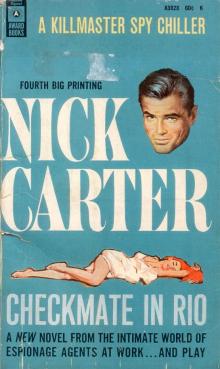 Checkmate in Rio
Checkmate in Rio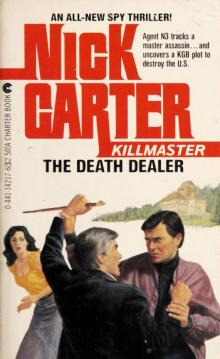 The Death Dealer
The Death Dealer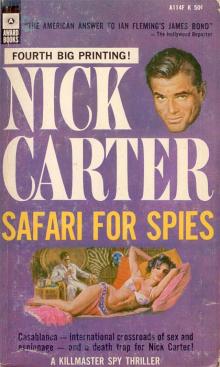 Safari for Spies
Safari for Spies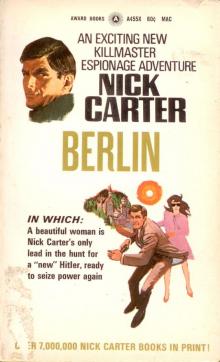 Berlin
Berlin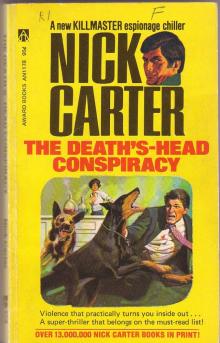 The Death’s Head Conspiracy
The Death’s Head Conspiracy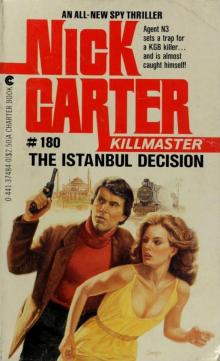 The Istanbul Decision
The Istanbul Decision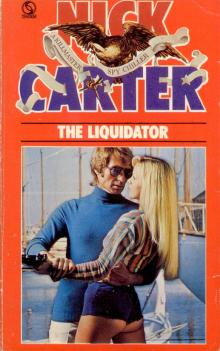 The Liquidator
The Liquidator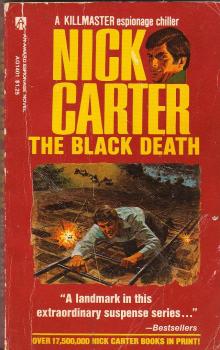 The Black Death
The Black Death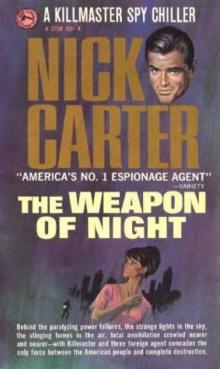 The Weapon of Night
The Weapon of Night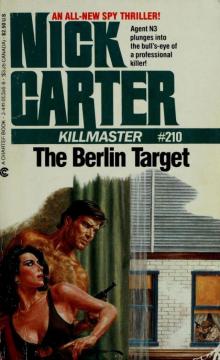 The Berlin Target
The Berlin Target Temple of Fear
Temple of Fear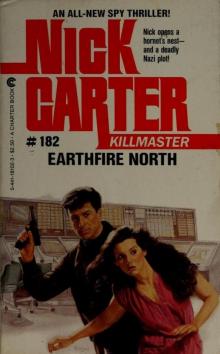 Earthfire North
Earthfire North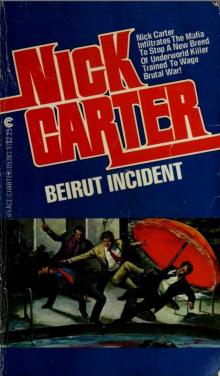 Beirut Incident
Beirut Incident White Death
White Death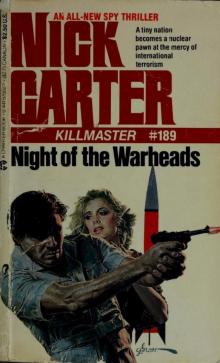 Night of the Warheads
Night of the Warheads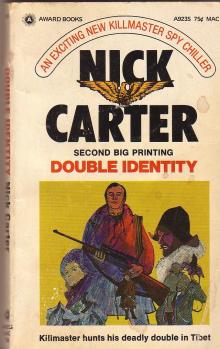 Double Identity
Double Identity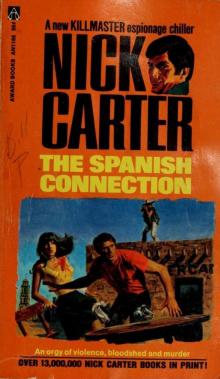 The Spanish Connection
The Spanish Connection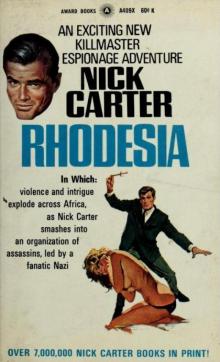 Rhodesia
Rhodesia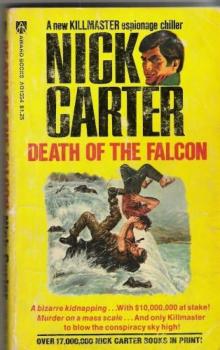 Death of the Falcon
Death of the Falcon The Executioners
The Executioners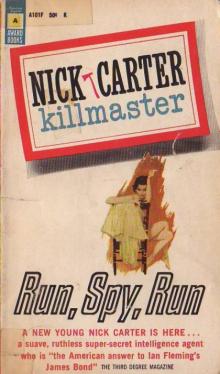 Run, Spy, Run
Run, Spy, Run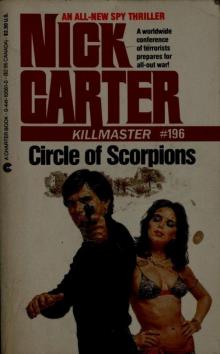 Circle of Scorpions
Circle of Scorpions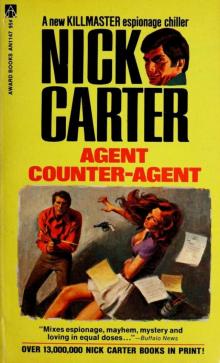 Agent Counter-Agent
Agent Counter-Agent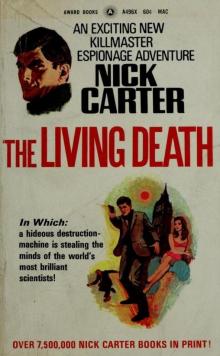 The Living Death
The Living Death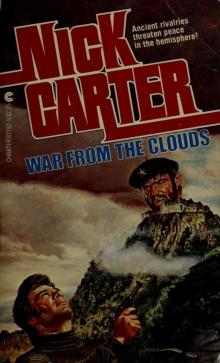 War From The Clouds
War From The Clouds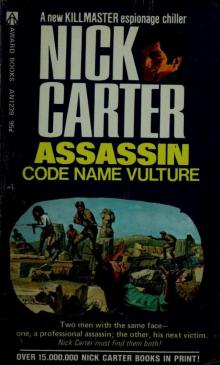 Assassin: Code Name Vulture
Assassin: Code Name Vulture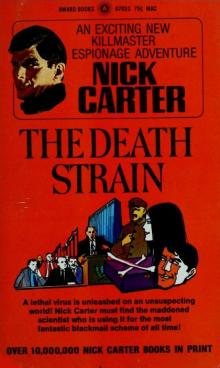 The Death Strain
The Death Strain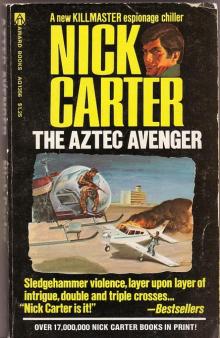 The Aztec Avenger
The Aztec Avenger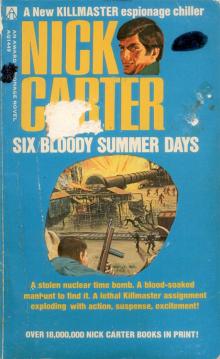 Six Bloody Summer Days
Six Bloody Summer Days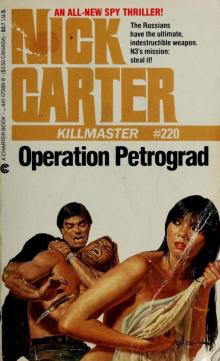 Operation Petrograd
Operation Petrograd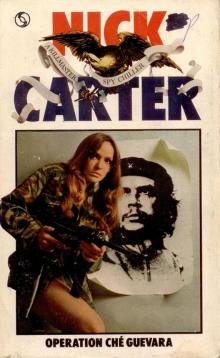 Operation Che Guevara
Operation Che Guevara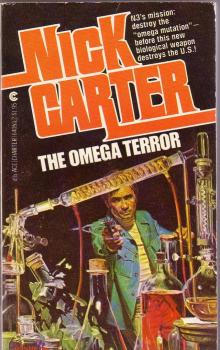 The Omega Terror
The Omega Terror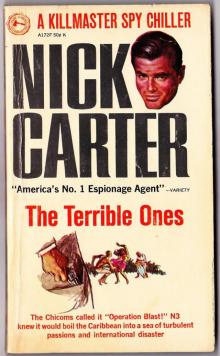 The Terrible Ones
The Terrible Ones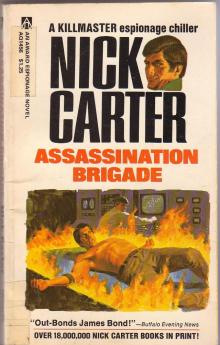 Assassination Brigade
Assassination Brigade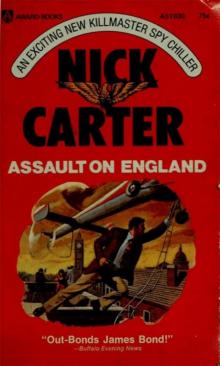 Assault on England
Assault on England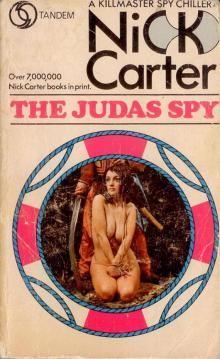 The Judas Spy
The Judas Spy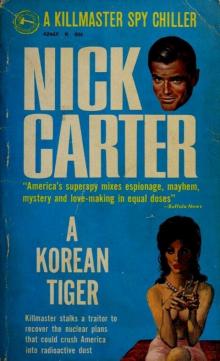 A Korean Tiger
A Korean Tiger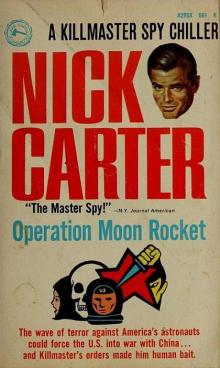 Operation Moon Rocket
Operation Moon Rocket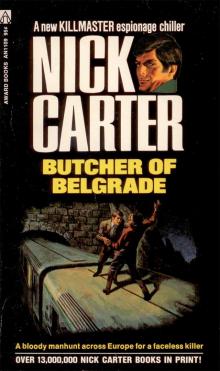 Butcher of Belgrade
Butcher of Belgrade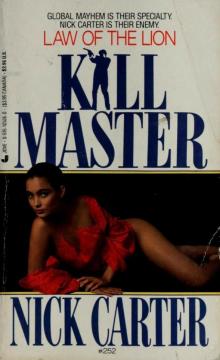 Law of the Lion
Law of the Lion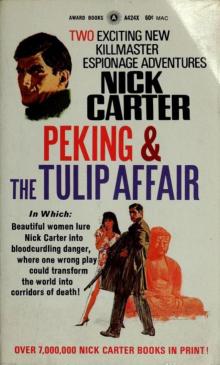 Peking & The Tulip Affair
Peking & The Tulip Affair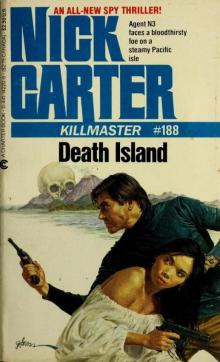 Death Island
Death Island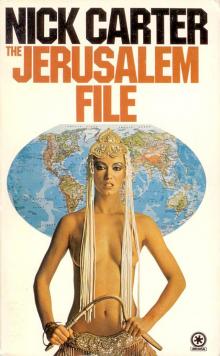 The Jerusalem File
The Jerusalem File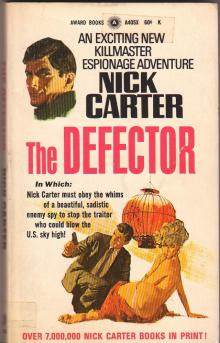 The Defector
The Defector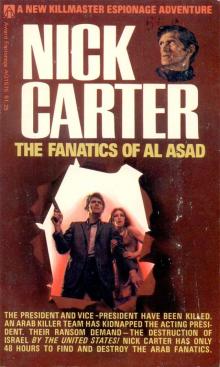 The Fanatics of Al Asad
The Fanatics of Al Asad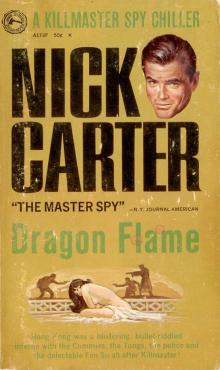 Dragon Flame
Dragon Flame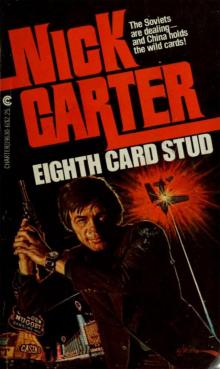 Eighth Card Stud
Eighth Card Stud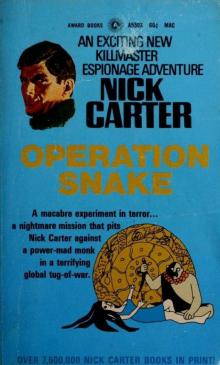 Operation Snake
Operation Snake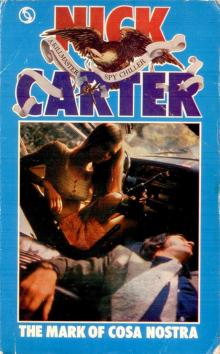 The Mark of Cosa Nostra
The Mark of Cosa Nostra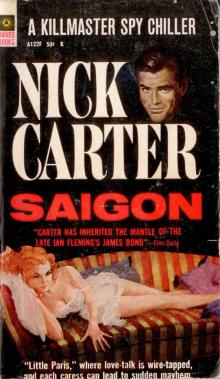 Saigon
Saigon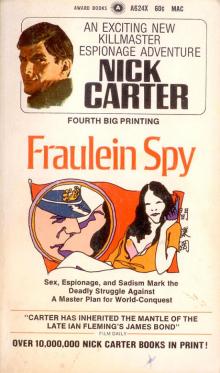 Fraulein Spy
Fraulein Spy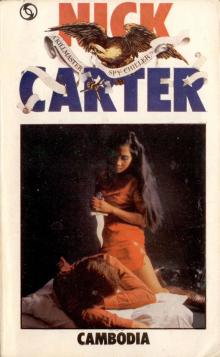 Cambodia
Cambodia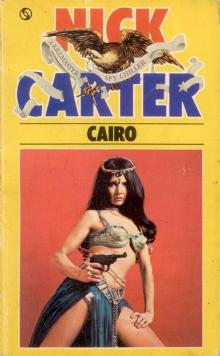 Cairo
Cairo